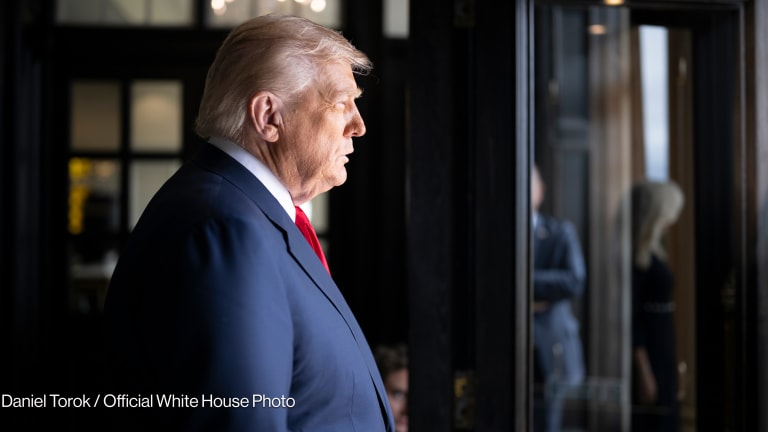
The development community takes a hard look in the mirror in the wake of a scandal at Oxfam, Congress rejects Trump’s budget (again), and Africa sees a leadership shakeup. This week in development.
Revelations of sexual misconduct by senior Oxfam officials have forced deep soul-searching among international aid and humanitarian organizations. Oxfam’s leaders will meet Monday with Penny Mordaunt, United Kingdom international development secretary, who says she plans to assess whether the group has the “moral leadership” to make the internal changes necessary to maintain their relationship with the U.K. Department for International Development. An investigation by The Times uncovered reports that Oxfam staff, including the country director, engaged in sexual exploitation and bullying, including paying women for sex, in the aftermath of Haiti’s devastating earthquake in 2010. Mordaunt warned the charity’s funding would be on the line as she conducts her review, and she outlined reforms that DFID will take to prevent and crack down on sexual misconduct among partners and grantees. Mordaunt is creating a new safeguarding unit at DFID that will look at “how to guard against criminal and predatory individuals being re-employed by charities and abusing again,” according to a statement. The minister also announced a “safeguarding summit” to convene aid leaders and charity groups later this month. While acknowledging that the development community must do more to prevent sexual exploitation, aid leaders have also warned that shining a spotlight on the systemic weaknesses that permit abuse should serve as an opportunity to fix them — not an argument for dismantling support for development.
Bill and Melinda Gates answered “the 10 toughest questions” they get asked about their philanthropic lives and vision in their annual letter published this week. The mega-donors addressed their partnerships with corporations, their decision to invest more in developing countries than in the United States, and the Trump administration’s impact on their work. While explaining that life-saving investments in poorer countries have generated bigger returns, Bill Gates acknowledged that the couple has been “looking at how we might expand our work in the U.S. beyond education.” Both Bill and Melinda challenged the Trump administration. Bill took aim at Trump’s repeated proposals to slash U.S. foreign aid budgets. “Although we disagree with this administration more than the others we’ve met with, we believe it's still important to work together whenever possible. We keep talking to them because if the U.S. cuts back on its investments abroad, people in other countries will die, and Americans will be worse off,” he wrote. In a subsequent interview with the New York Times, Melinda Gates took issue with Trump’s imposition of restrictive family planning policies, charging that the expansion of the Mexico City Policy to all U.S. global health funding has created, “chaos.”
President Donald Trump released his fiscal year 2019 budget proposal on Monday, calling for many of the same cuts to U.S. foreign affairs programs that the White House proposed last year — and that the U.S. Congress has largely rejected. In what one group dubbed the “groundhog budget” — in reference to an American film in which the hero is forced to live the same day over and over again — Trump proposed a 30 percent reduction to the international affairs budget, compared to fiscal year 2017. While the White House budget proposal will likely bear little resemblance to the spending plan Congress ultimately creates, U.S. development advocates remain worried they could face cuts. In their budget agreement earlier this month, lawmakers agreed to reduce funding for an account that funds U.S. efforts in conflict areas, called the “overseas contingency operations” account. Congress still has to determine how it will allocate a pot of $63 billion of available money, and aid groups are pushing lawmakers to put enough of this money into foreign aid to make up for the cuts to OCO. While the U.S. development community largely dismissed the White House budget proposal as “dead on arrival,” many found reason to celebrate one policy idea that the Trump administration lent its support: the creation of a new U.S. development finance institution. A group of lawmakers from both parties are expected to introduce legislation calling for such an institution soon, and with strong support now from the White House, this could be the moment for this long-sought proposal.
A burst of resignations and appointments have shaken Africa’s leadership. Jacob Zuma resigned as president of South Africa Wednesday night, facing numerous allegations of corruption and calls from his own party to step down. In his wake, Cyril Ramaphosa, the former deputy president, was elected by South Africa’s parliament. Ramaphosa faces an economy in desperate need of revitalization and a water crisis in Cape Town. In a surprise announcement Thursday, Ethiopian Prime Minister Hailemariam Desalegn also revealed he is stepping down, calling his departure, “vital in the bid to carry out reforms that would lead to sustainable peace and democracy.” Hailemariam cited the mass protests — waged in opposition to civil rights abuses and government development plans — that have left hundreds dead under his administration. He said he plans to remain involved in Ethiopia’s reform and development efforts. Former Liberian President Ellen Johnson Sirleaf was awarded the 2017 Ibrahim Prize for Achievement in African Leadership, becoming the first woman to win the award, which carries a cash prize of more than $5 million.








